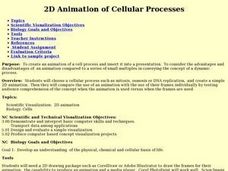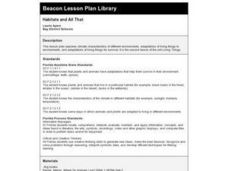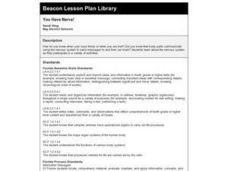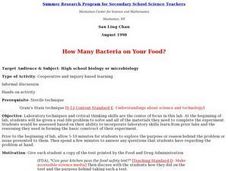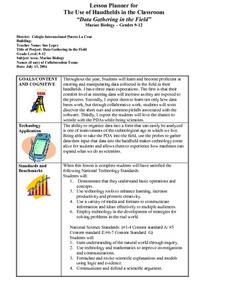Curated OER
2D Animation of Cellular Processes
Learners create an animation of a cell process and insert it into a presentation. They choose a cellular process such as mitosis, osmosis or DNA replication, and create a simple 2D animation.
Curated OER
Habitats and All That
First graders read books, complete online explorations and discuss the ways in which animals adapt to their habitats in order to survive. They create accordion books, play matching games and dramatize animal adaptations.
Curated OER
What a Waste!
Fourth graders explore the kidney, bladder, and function of the excretory (urinary) system.
Curated OER
You Have Nerve!
Fourth graders investigate the nervous system and how it communicates messages to and from the brain.
Curated OER
Systems Working Together
Fourth graders practice reading in the content areas (science) in order to explore the interdependence of the body systems. They answer written questions after reading.
Curated OER
Why Is Evolution Controversial?
Students explore why evolution has always been a controversial topic. They use scientific process to determine patterns and to critically analyze alternative explanations for natural phenomena.
Curated OER
Those Before Us
Students examine medical pioneers and identify their characteristics. They survey their contributions to the medical field and society and present persuasive argument for or against modern medical pioneers.
Curated OER
What Proof is There to Support Biological evolution?
Pupils identify who developed the theory of evolution. The concepts of adaptation and development are discussed. The age of the earth is explored in relationship to the development of various species. The condition of the environment of...
Curated OER
How Many Bacteria on Your Food?
Students discuss and conduct a food safety experiment which looks at bacteria and food poisoning. They swab the other area of some food and grow bacteria in an agar plate.
Curated OER
Endocrine Excitement!
Students are divided into a group of hormones and a group of receptors. The hormones have to find their matching receptors, and the pair, once matched, perform a given action. This activity helps students examine the specificity of...
Curated OER
Foodborne Illness Educational Materials
Students work in teams to research and create educational material succinctly summarizing known salient fact, including prevention, of a particular foodborne illness. Pupils educational materials are presented in both oral and written...
Curated OER
Invertebrate Study
Students study invertebrates, more specifically flatworms, in this technology-based lesson which features www.nettrekker.com and word processing skills. The lesson concludes with each student create an individual word file of information.
Curated OER
Organelle Want Ads
Students review the components of the cell by creating advertisements for organelles in this activity reviewing cell contents. The activity can be completed in 30-40 minutes and ends with a review question for individual, student...
Curated OER
The Structure of DNA
Students will demonstrate knowledge of the structure of DNA by constructing simple models of DNA with materials given to them in class. They will also discover that some female scientists such as Rosalind Franklin have not been given...
Curated OER
Sustainable Agriculture
Students explore examples of methods utilized in traditional agricultural practices. They state examples ot methods used in sustainable agricultural practices. They draw conclusions from information presented to them.
Curated OER
PHENOTYPIC AND GENOTYPIC CHANGES IN BACTERIA
Students use a rapid method to render the bacterium Escherichia coli "competent" in order to uptake plasmid DNA. They also have growth on the plain LB plates by the untransformed cells (which serve as controls). Students perform a cell...
Curated OER
The Ultimate Predator
Students already know that the most effective predator on earth today. They pay close attention, because after the teacher have finished lecturing, their assignment is to design a new "Ultimate Predator." Students present their...
Curated OER
The Ultimate Predator
Students listen to a lecture by the teacher about the "Ultimate Predator." They design a new "Ultimate Predator." Students present their creations to the class and attempt to convince their classmates that their predator is indeed the...
Curated OER
Phenotypic and Genotypic Changes in Bacteria
Students investigate a rapid method to render the bacterium Escherichia coli "competent" to uptake plasmid DNA. They demonstrate the phenotypic changes associated with transformation. They perform a cell resuspension from the...
Curated OER
Do You Have the Guts?
Seventh graders Name and locate the major internal organs of the human body and the frog. Students virtually dissect a frog and compare organs to the human organs. Students draw illustrations of their learnings.
Curated OER
??Data Gathering in the Field??
Students demonstrate that they understand basic operations and concpets, students further use technology to enhance learning, increase productivity and and promote their creativity. Students gain an understanding of the world through...
Curated OER
Who's Who and How Do You Know for Sure?
Young scholars investigate the applications of DNA fingerprinting, They read crime scenarios and using the details of the crime and laboratory experimentation decide the suspects guilt or innocence.
Curated OER
Wild Animal Science
Students discover how environmental factors impact the survival of a population. In this landscape design lesson, students create a new animal and discuss the relationship between the animal and its environment before creating a habitat...
Curated OER
Build Your Own Bug
Students create a unique bug. In this lesson plan about bugs, students use their imagination to develop a new kind of bug. Students use construction paper, scissors, glue, and crayons to make their bug. Students explore the different...
Other popular searches
- Mean, Median, Mode
- Media Education
- Communications and the Media
- Usa and World News
- Education News
- Mean Median Mode
- Printing Press
- Mediation
- Agriculture News
- News
- Median
- News Magazines


